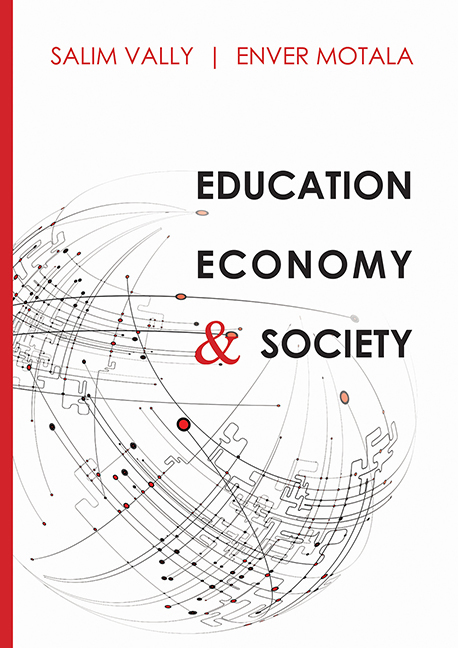Book contents
- Frontmatter
- Contents
- Foreword
- Preface
- About the contributors
- Acknowledgements
- Abbreviations and acronyms
- Chapter 1 ‘NO ONE TO BLAME BUT THEMSELVES’: Rethinking the Relationship between Education, Skills and Employment
- Chapter 2 EDUCATION AND ECONOMY: Demystifying the Skills Discourse
- Chapter 3 UNIVERSITIES AND THE ‘KNOWLEDGE ECONOMY’
- Chapter 4 GOING AROUND IN CIRCLES: Employability, Responsiveness, and the Reform of the College Sector
- Chapter 5 BUILDING A TRANSFORMATIVE PEDAGOGY in Vocational Education
- Chapter 6 SKILLS? WHAT SKILLS? JOBS? WHAT JOBS? An Overview of Research into Education/Labour Market Relationships
- Chapter 7 DEBATING THE NEXUS of Education, Skills and Technology in the Age of Lean Production: A Case Study of the ArcelorMittal Vanderbijlpark Plant
- Chapter 8 SKILLS, JOBS AND DECEPTION: Examples from the South African Workplace
- Chapter 9 ON THE USE AND ABUSE OF EDUCATION: Reflections on Unemployment, the ‘Skills Gap’ and ‘Zombie Economics’
- Chapter 10 THE YOUTH WAGE SUBSIDY in South Africa: Employment, Skills and ‘Churning’
- Chapter 11 EPISTEMIC INJUSTICE and the Struggle for Recognition: Human Dignity and the Recognition of Prior Learning
- Chapter 12 (RE)CLAIMING WORKERS' EDUCATION
- Chapter 13 SKILLS DEVELOPMENT in Post-Apartheid South Africa: Issues, Arguments and Contestations
- Index
Chapter 13 - SKILLS DEVELOPMENT in Post-Apartheid South Africa: Issues, Arguments and Contestations
Published online by Cambridge University Press: 16 February 2020
- Frontmatter
- Contents
- Foreword
- Preface
- About the contributors
- Acknowledgements
- Abbreviations and acronyms
- Chapter 1 ‘NO ONE TO BLAME BUT THEMSELVES’: Rethinking the Relationship between Education, Skills and Employment
- Chapter 2 EDUCATION AND ECONOMY: Demystifying the Skills Discourse
- Chapter 3 UNIVERSITIES AND THE ‘KNOWLEDGE ECONOMY’
- Chapter 4 GOING AROUND IN CIRCLES: Employability, Responsiveness, and the Reform of the College Sector
- Chapter 5 BUILDING A TRANSFORMATIVE PEDAGOGY in Vocational Education
- Chapter 6 SKILLS? WHAT SKILLS? JOBS? WHAT JOBS? An Overview of Research into Education/Labour Market Relationships
- Chapter 7 DEBATING THE NEXUS of Education, Skills and Technology in the Age of Lean Production: A Case Study of the ArcelorMittal Vanderbijlpark Plant
- Chapter 8 SKILLS, JOBS AND DECEPTION: Examples from the South African Workplace
- Chapter 9 ON THE USE AND ABUSE OF EDUCATION: Reflections on Unemployment, the ‘Skills Gap’ and ‘Zombie Economics’
- Chapter 10 THE YOUTH WAGE SUBSIDY in South Africa: Employment, Skills and ‘Churning’
- Chapter 11 EPISTEMIC INJUSTICE and the Struggle for Recognition: Human Dignity and the Recognition of Prior Learning
- Chapter 12 (RE)CLAIMING WORKERS' EDUCATION
- Chapter 13 SKILLS DEVELOPMENT in Post-Apartheid South Africa: Issues, Arguments and Contestations
- Index
Summary
Introduction
South Africa's transition from the apartheid system to a post-apartheid democratic system began in a historical moment that coincided broadly with the ‘collapse’ of the Soviet Union and the ushering in of a new global order of capitalist economic domination often referred to as the ‘unipolar’ world system. This moment was followed by large-scale global capitalist restructuring which pressured many developing countries to embrace neoliberal economic policy reforms.
The post-apartheid state ushered in a period of wide-scale reform of public policies, amongst which were reforms to the country's education and training systems. These reforms were proposed as a means to begin to redress the historical imbalances created by apartheid's racialised labour market, which had resulted in what McGrath, Badroodien, Kraak and Unwin (2004) have characterised as a ‘low skills regime’. A key challenge facing the new government was to develop policies that could address this historical legacy while simultaneously overseeing the integration of the South African economy into a hostile global capitalist economic system. This resulted in an expectation that the post-apartheid state would develop policies that will redress the historical imbalances that occurred as a result of apartheid. Scholars such as Motala, Vally and Spreen (2010:241) have argued:
At the end of apartheid there was a real expectation that the death of a racist, fragmented, incoherent, yet planned education and training system together with its policies and practices – the manufactured bureaucracies spawned to give effects to the intentions of apartheid ideologues and political leaders and its deleterious outcomes, would be terminated once and for all.
In light of the various, conflicting pressures for policy reforms from domestic and global forces, the democratic government has chosen contradictory approaches to development. These are directed at redressing the historical imbalances, on the one hand, and economic and social policy choices that have so far been unsuccessful in transforming the character of the South African economy, on the other. The discourse on skills development therefore is an expression of ideological and political contestations emerging within this broader framework of policy development in the period of the political transition. My contention is that the prevalence of human capital theory assumptions on skills as evidenced in the broad acceptance of outcomes-based education (OBE) reforms and the National Qualifications Framework (NQF) in the post-apartheid state have contributed immensely to the current situation defined as a crisis of skills development.
- Type
- Chapter
- Information
- Education, Economy & Society , pp. 244 - 264Publisher: University of South AfricaPrint publication year: 2014

